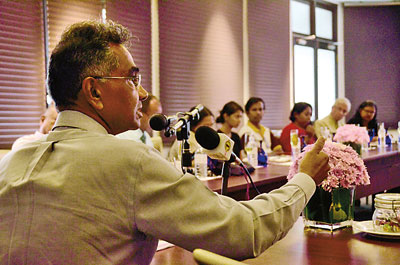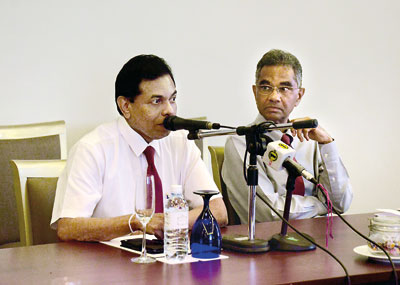News
Sri Lanka set to spotlight advances in the health sector
View(s):- 69th session of WHO’s South East Asian Regional Committee opens in Colombo
- Elimination of malaria and tackling NCDs by setting up lifestyle and well-woman clinics
By Kumudini Hettiarachchi
Sri Lanka is set to showcase its ‘low-cost’ but successful model as the curtain rises on the most powerful health session of the region on September 5 in Colombo. It will not be just meeting after meeting over five days at the 69th Session of the Regional Committee for the South-East Asia Region (SEAR), the ‘governing body’ of the World Health Organization (WHO) in the region.
While setting the health agenda for the next year and reviewing progress at extensive sessions chaired by Health, Nutrition and Indigenous Medicine Minister Dr. Rajitha Senaratne, the delegates will also journey out of Colombo into the hills of Kandy on September 8.

WHO Representative to Sri Lanka Dr. Jacob Kumaresan at Monday’s media briefing at the Galle Face Hotel. Pix courtesy WHO
They will see first-hand how Sri Lanka has made a strong commitment to tackling the threat of non-communicable diseases (NCDs), the modern-day scourge, as opposed to communicable diseases (CDs) of earlier times, by visiting healthy lifestyle and well-woman clinics in Kandy.
With the inauguration of the 69th Regional Committee Meeting of SEAR at the Nelum Pokuna with the highest representation from the WHO, its Director-General Dr. Margaret Chan and SEAR’s Regional Director Dr. Poonam Khetrapal Singh, Sri Lanka is hopeful of getting a pat on the back for achieving many health milestones, the latest being certification for the elimination of malaria.
The sessions which will be held at the Galle Face Hotel will see interactions among the Health Ministers of the 11 SEAR countries as well as their delegations, while technical input will be provided by WHO subject experts from different fields, said Public Information Advocacy Officer Shamila Sharma based at the SEAR Office, giving a comprehensive preview to the media on Monday.

The Director-General of Health Services, Dr. Palitha Mahipala, briefs the media on Monday on the Regional Committee Meeting of the World Health Organization (WHO) to be held in Colombo on September 5, while WHO Representative to Sri Lanka Dr. Jacob Kumaresan looks on, at the Galle Face Hotel.
The SEAR countries are Sri Lanka, Bangladesh, Bhutan, Democratic People’s Republic of Korea, India, Indonesia, Maldives, Myanmar, Nepal, Thailand and Timor-Leste (which hosted the Regional Committee Meeting last year).
The ‘agenda’ will include two ministerial roundtables on NCDs and Sustainable Development Goals (SDGs) & Universal Health Coverage; and in-depth discussions on the very worrisome anti-microbial resistance which is looming as a different kind of plague in current times; International Health Regulations; ending preventable maternal and child mortality including neonatal mortality; and time-bound elimination of neglected tropical diseases.
“The Regional Committee will also focus on the first review of progress and challenges of the decade of health workforce strengthening in the region, promoting physical activity and addressing the burden of malnutrition,” said Ms. Sharma, pointing out that on Sri Lanka’s request ‘migration and health’ has also been included.
The meeting will study the Regional Action Plan and targets for the prevention and control of NCDs as well as challenges faced in the eradication of polio.
Think globally and act locally
It is vital to think globally and act locally, reiterated the WHO Representative to Sri Lanka, Dr. Jacob Kumaresan, pointing out that there has been a paradigm shift in the landscape of health, with more people working on health than ever before.
We need to make collective decisions and then transfer and implement them locally, according to him. Citing the example of polio, he reiterates that infection, be it bacteria, viruses or anything else, is just a plane-ride away. This is why vigilance is needed not just in one country but across the world.
Paying tribute to Sri Lanka, Dr. Kumaresan says that the country can be a ‘lighthouse’ to the world, showing the way, but Sri Lanka cannot be complacent about its achievements.
“Can the same infrastructure in place in the country be used for behavioural changes? That’s the big question. Should they be re-modelled for the future,” he asked, with a gentle reminder that in public health, the last w mile is the most difficult to run. By 2030, the country needs to ensure that no one has been left behind in the arena of health.

